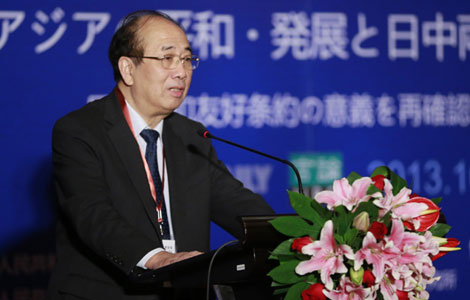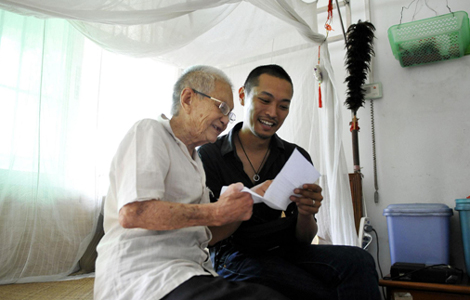China opens photography exhibition on Japan's aggression
[2014-03-13 19:00]A photography exhibition on Japan's invasion history of China opened in Beijing on Wednesday.
Japan urged to reflect on new CO2 target
[2013-11-19 11:05]A senior Chinese official urged here on Monday the Japanese government to reflect on its decision to slash its greenhouse gas emissions target.
Japan softens targets for greenhouse gas reduction
[2013-11-16 07:36]Japan on Friday drastically weakened its greenhouse-gas reduction target, bowing to the impact of a shuttered nuclear power industry but drawing international criticism at United Nations climate change talks.
Abe honors heroic Chinese student
[2013-11-14 09:14]Shanghai-born Yan Jun (L), 26, receives a certificate of appreciation from Japan's Prime Minister Shinzo Abe for his rescue work in saving a nine-year-old boy from a typhoon-swollen river in Osaka on September 16, 2013, at Abe's official residence in Tokyo November 13, 2013.
Major conference discusses anti-Japanese war
[2013-11-08 15:50]The War of Resistance against Japanese Aggression (1937-45) and modern international relationships were the topics of a major conference attended by 130 international scholars at Chongqing University on Friday.
Japan beat Chinese Taipei for ticket to Turkey
[2013-11-03 09:13]Japan unleashed a 14-0 fury at the end of the first quarter to effectively seal the issue as Japan made it to their first FIBA Asia Women's Championship final in 10 years after beating Chinese Taipei 74-56 here on Saturday.
Forum urges stable relations for China, Japan
[2013-10-28 00:29]A stable China-Japan relationship is in the interests of the two countries, Asia and the world, participants in the Beijing-Tokyo Forum agreed on Sunday.
Beijing Consensus
[2013-10-28 00:17]The ninth Beijing-Tokyo Forum took place in Beijing on Oct 26 and 27. About 80 people of vision and insight from China and Japan frankly exchanged views on politics, economy, security, media, and the deteriorating attitude of the Chinese and Japanese people toward each other.
Deadlock new test for China-Japan relations
[2013-10-26 15:40]A slump in business cooperation amid freezing political relations between China and Japan after the Diaoyu Islands disputes has imposed a new challenge for the two countries.
Dialogue and exchanges in need for China-Japan ties
[2013-10-26 14:15]Japanese Ambassador to China Masato Kitera expressed deep concerns about the strained relationship between China and Japan when he was addressing the opening ceremony of Beijing-Tokyo Forum on Saturday.
Forum to guide China and Japan
[2013-10-26 00:54]More exchanges are expected to help China and Japan dispel doubts and see the way forward at a time of strained bilateral relations.
Bonds of friendship forged in a leprosy village
[2013-10-25 14:42]Ryotaro Harada founded the nongovernmental organization JIA for leprosy elimination. By 2012, some 11,400 volunteers were mobilized by JIA to help people with leprosy in 61 leprosy villages across Guangdong, Guangxi, Hunan, Hubei and Hainan provinces.






